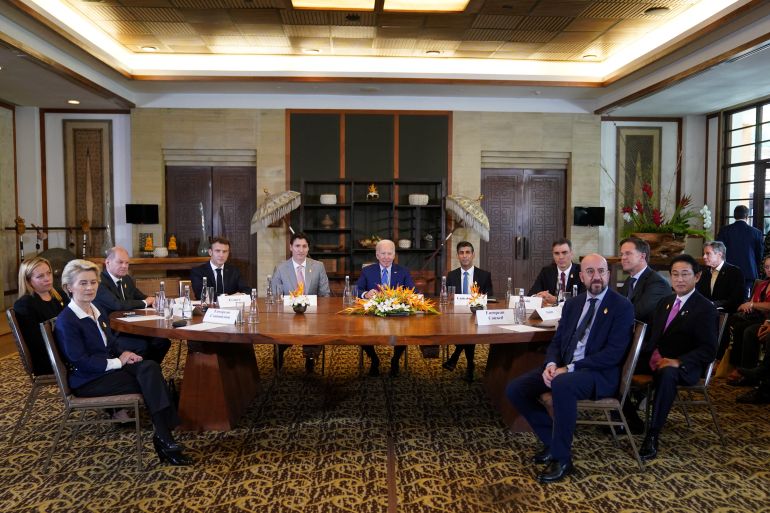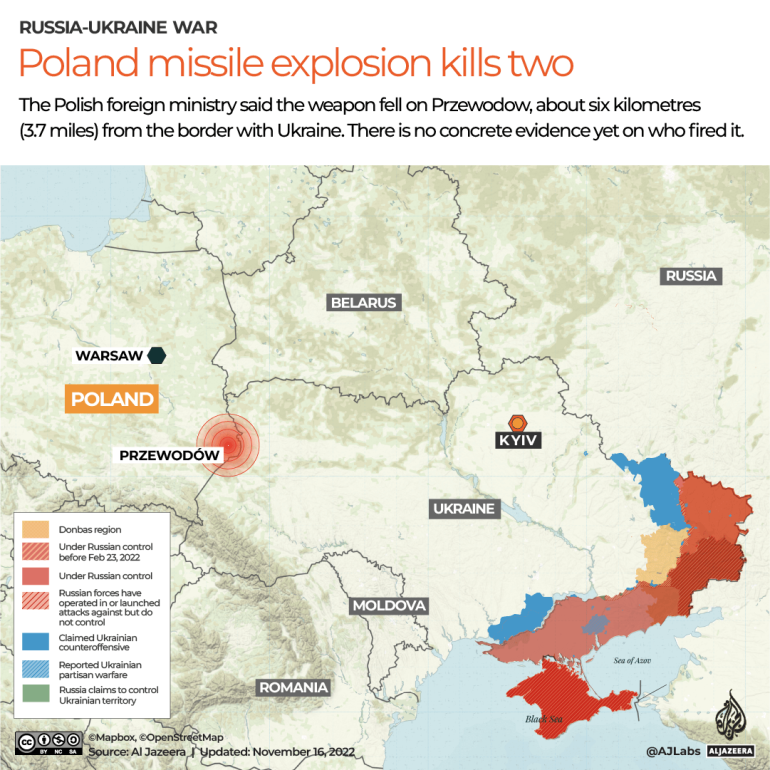World reacts to missile blast in Poland
An explosion in eastern Poland near Ukraine’s border killed two, prompting world leaders to call for an investigation.

A missile hit Przewodow village in eastern Poland near the Ukrainian border and killed two people on Tuesday, raising alarm among world leaders about a possible escalation of the war in Ukraine.
The blast occurred as Russian attacks hit cities and towns throughout Ukraine.
Keep reading
list of 3 itemsG20 leaders declaration denounces ‘Russian aggression’ in Ukraine
Photos: Russia hits cities across Ukraine with wave of missiles
While Russia and Ukraine were quick to trade blame over the incident, the United States and NATO adopted a cautious approach to ease tensions.
Ultimately, US President Joe Biden said the missile that struck the village in Poland was “unlikely” to have been fired from Russia.
Poland’s President Andrzej Duda, who on Tuesday suggested the missiles were Russian, changed track on Wednesday and said it is “very likely” that the rocket was from Ukraine’s air defence system.
Here is how some world leaders reacted:

Poland
President Duda of Poland, a strong ally of Kyiv, said on Wednesday the missile appeared to be from Ukraine’s air defence.
“Absolutely nothing indicates that this was an intentional attack on Poland … It’s very likely that it was a rocket used in anti-missile defence, meaning that it was used by Ukraine’s defence forces,” he told reporters.
Previously, he had said it was “most probably” a Russian attack but that its origins were still being verified.
“We are acting with calm,” he said. “This is a difficult situation.”
Polish Foreign Minister Zbigniew Rau earlier summoned the Russian ambassador and “demanded immediate detailed explanations”, the government said.
Ukraine
Zelenskyy told G20 leaders there was a “terrorist state” among them and accused Russia of the missile attack.
He also had a call with Duda to express his condolences and reiterate Ukraine’s support for Poland.
“We exchanged available information and are clarifying all the facts. Ukraine, Poland and all of Europe and the world must be fully protected from terrorist Russia,” Zelenskyy wrote on Twitter.
After NATO and Poland said the blast was likely a Ukrainian accident, officials in Kyiv demanded to visit the site of the blast and asked that allies share their information.
Had a call with 🇵🇱 President @AndrzejDuda. Expressed condolences over the death of Polish citizens from Russian missile terror. We exchanged available information and are clarifying all the facts. 🇺🇦, 🇵🇱, all of Europe and the world must be fully protected from terrorist Russia.
— Володимир Зеленський (@ZelenskyyUa) November 15, 2022
Russia
Vasily Nebenzya, head of the permanent mission of Russia to the United Nations, said the missile blast was an attempt to provoke a direct clash between Russia and NATO.
Dmitry Polyanskiy, the first deputy permanent representative of Russia to the UN, wrote on Twitter: “I advise everyone to analyse facts before rushing to conclusions. It’s obvious that impact of direct rocket strike would be significantly bigger than the pictures show.”
The Russian defence ministry said the explosion had been caused by a Ukrainian air defence missile, and that Russian strikes in Ukraine had been no closer than 35km (22 miles) from the Polish border.
“The photos published in the evening of Nov. 15 in Poland of the wreckage found in the village of Przewodow are unequivocally identified by Russian defence industry specialists as elements of an anti-aircraft guided missile of the S-300 air defence system of the Ukrainian air force,” the Russian defence ministry said in a statement.
On Wednesday, the Kremlin decried Poland’s initial response as hysterical and said the US had been more “measured” – rare praise.
I advise everyone to analyze facts before rushing to conclusions. It’s obvious that impact of direct rocket strike would be significantly bigger than the pictures show #Przewodow https://t.co/WQXTG3fzrK
— Dmitry Polyanskiy (@Dpol_un) November 16, 2022
United States
US President Joe Biden attended an “emergency” meeting of the G7 and NATO leaders in Indonesia on Wednesday morning for consultations over the explosion, and later said the missile was “unlikely” to have been fired from Russia.
“There is preliminary information that contests that,” Biden told reporters when asked if the missile had been fired from Russia. “It is unlikely in the lines of the trajectory that it was fired from Russia, but we’ll see.
“I’m going to make sure we find out exactly what happened,” he said. “And then we’re going to collectively determine our next step as we investigate.”
Unnamed US officials told The Associated Press news agency the missile was fired by Ukrainian forces at an incoming Russian missile.
Biden called Duda to express his condolences.
On Twitter, Biden promised “full support for and assistance with Poland’s investigation”.
Earlier, I met with G20 and NATO Leaders to discuss the explosion in Eastern Poland near the Ukrainian border.
We offer our full support for and assistance with Poland’s ongoing investigation. pic.twitter.com/KZcWZBo4VI
— President Biden (@POTUS) November 16, 2022
NATO secretary-general
Jens Stoltenberg said even though the Ukrainian air defence missile likely caused the explosion, Russia should be ultimately blamed since it is behind the war.
“This is not Ukraine’s fault. Russia bears ultimate responsibility as it continues its illegal war against Ukraine,” he said.
He had called an emergency meeting of the alliance’s envoys in Brussels on Wednesday. Like Biden, he offered his condolences to Duda.
“NATO is monitoring the situation and Allies are closely consulting. Important that all facts are established,” Stoltenberg wrote on Twitter.
Spoke with President Duda @prezydentpl about the explosion in #Poland. I offered my condolences for the loss of life. #NATO is monitoring the situation and Allies are closely consulting. Important that all facts are established.
— Jens Stoltenberg (@jensstoltenberg) November 15, 2022
Turkey
Turkey’s President Recep Tayyip Erdogan, who holds good ties with both warring sides, said Russia had “nothing to do” with the missiles and that he respects Moscow’s statement denying the accusation.
“Russia saying this has nothing to do with them and Biden saying these missiles are not Russian-made show that this has nothing to do with Russia,” Erdogan said at a news conference during the G20 summit in Bali, Indonesia.
“It could be a technical glitch or something else. That’s why it’s necessary to investigate and research into this.”
He said pointing fingers at Russia after finding out that the missile is not Russian-made “will cause provocation”, as Turkey has been working to “gather Russia and Ukraine around the same table” for negotiations.
European Union
European Commission President Ursula von der Leyen said the G20 summit participants discussed the blast in Poland and expressed their continued solidarity with Ukraine.
“We offer our full support to Poland and assistance with the ongoing investigation. We will remain in close contacts with our partners on the next steps. We will stand with Ukraine as long as it takes,” she said.
While G20 leaders were meeting and calling for the war to end, Russia conducted massive strikes against Ukraine.
With G7 and NATO partners, we condemn these brutal acts.
We also offer full support to Poland and assistance with the investigation on the explosion at the border. pic.twitter.com/gohB25y1et
— Ursula von der Leyen (@vonderleyen) November 16, 2022
Italy
Prime Minister Giorgia Meloni said the origin of the missile does not change much since Russia is still to blame for attacking infrastructure in Ukraine.
“The possibility that the missile falling on Poland was not a Russian missile but a Ukrainian one changes very little,” she said.
Meloni said she spoke to Polish Prime Minister Mateusz Morawiecki.
China
Chinese foreign ministry spokeswoman Mao Ning called for calm.
“Under the current situation, all relevant parties should stay calm and exercise restraint to avoid escalation of the situation,” she told a press briefing.
United Kingdom
Prime Minister Rishi Sunak spoke to Duda about the missile blast and “reiterated the UK’s solidarity with Poland and expressed condolences for the victims”, he wrote on Twitter.
I have just spoken to Polish President @AndrzejDuda following reports of a missile strike in Poland.
I reiterated the UK’s solidarity with Poland and expressed condolences for the victims.
We will remain in close contact and continue to coordinate with our NATO allies.
— Rishi Sunak (@RishiSunak) November 15, 2022
Germany
Chancellor Olaf Scholz called for a careful inquiry.
“This destruction must be investigated, the rocket parts must be investigated and then we must wait for the results before they are publicly released,” Scholz told reporters in Indonesia.
“In such a serious matter, there must not be any hasty conclusions about the course of events before this careful investigation.”
Meanwhile, a German government spokesperson dismissed Ukraine’s call for a no-fly zone, saying such a move would threaten a direct confrontation between Russia and NATO.
Ukraine’s presidential adviser Mykhailo Podolyak had earlier tweeted that European countries should “close the sky” over Ukraine after the blast.